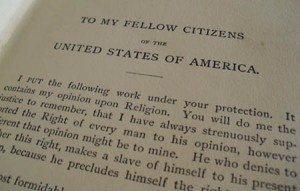Lizard Eater is a blogger I stumble on now and again via the UU blog aggregator and she has a cool post about UUs claiming religious language. I was gonna leave a comment but it began running a little long and I’ve had this post brewing in my head for several weeks anyway. It’s as good a time as any to put it out there.
When I was in the military, the gunnery sergeant I worked for paid me a dubious compliment by nominating me for Marine of the Quarter. In doing so I had to go before a panel of senior Marines and let them grill me for a couple of days on various things.
There was a physical fitness test, room inspection, uniform inspection, drill command evaluation, Marine Corps history test and a leadership evaluation.
I remember one of the questions was on the 14 traits of Marine Corps leadership and which one I thought was the most important. I said I thought “initiative” was the most important because through initiative you put yourself in situations to exercise the other traits. Not sure if it was my hours of hand-polishing my old “chocolate bars” leather shoes or my answer to that question but I’m proud to say I won that board.
Anyway… in response to LE’s list of words she used in her sermon I was going to say she forgot the word “Grace”.
I think it’s the same as my leadership story and the word “initiative”.
At least for me, I think in embracing the concept that we have received grace (from whatever source: e.g. sacred community, The Divine, our spouse, ourselves, etc.) puts us in a situation to exercise other faithful actions such as: gratitude, service, prayer, fellowship, humility, etc.
Does that make sense? Not sure if I’m explaining this quite right.
Let me see if I can put it another way… I don’t think prayer just for the sake of praying is quite right. I don’t think performing service or putting faith into action simply for the sake of service or action is right. In fact, I think it’s self serving. I think it rings hollow, kinda like from this passage in I Corinthians. You could almost change the word love for grace but I’m no theologian so it may be a stretch to do so.
But the idea kinda reminds me of an old Calvin and Hobbes comic strip I saw where Calvin asks if Hobbes thought he would still get toys from Santa if he acted good and did good things but didn’t really mean it.
😐
I think when we do those things that faithful, religious people do like pray, meditate, help our fellow man or support our friends in fellowship from a starting point of grace it is meaningful. Or if we make music and poetry and art, raise a child, care for those weaker than us, speak up for justice or any of the other things that are of the human condition that are positive and good… when we do those things because we truly believe that we have received love beyond any condition… beyond anything we have done before where we may have “missed the mark” then we have truly become a faithful person. We have truly served our fellow man. We have truly served ourself. We have truly worshiped The Divine.
Namasté. Salaam ‘Alaykum. Shalom. Amen.


Wow, good stuff here, Jules. I don’t know if you ever preach, but I think you could unpack this and have a very powerful sermon.
Best definition of grace I have heard. Thank you.